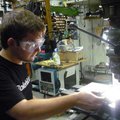 Hi everyone, that's for joining us. Today on the Hack Chat we have @Michael Weinberg from OSHWA, and we're going to be celebrating Open Hardware Month, which is October BTW.
Hi everyone, that's for joining us. Today on the Hack Chat we have @Michael Weinberg from OSHWA, and we're going to be celebrating Open Hardware Month, which is October BTW.
@Michael Weinberg - can you tell us a little about yourself and your role at OSHWA?
 Sure! Hi everyone and thanks for having me. I am currently the president of the board of OSHWA. One of the major things I am responsible for is OSHWA's open source hardware certification program (https://certification.oshwa.org/)
Sure! Hi everyone and thanks for having me. I am currently the president of the board of OSHWA. One of the major things I am responsible for is OSHWA's open source hardware certification program (https://certification.oshwa.org/)
 I came to OSHWA because of an interest in open source 3D printers, especially some of the legal issues they raise
I came to OSHWA because of an interest in open source 3D printers, especially some of the legal issues they raise
 A big part of the certification program was helping people understand some of the licensing issues around open source hardware, which can be complicated
A big part of the certification program was helping people understand some of the licensing issues around open source hardware, which can be complicated
 I'll also say that I know that there will be some other members of the OSHWA board joining for at least part of the chat, so don't be surprised when they chime in
I'll also say that I know that there will be some other members of the OSHWA board joining for at least part of the chat, so don't be surprised when they chime in
 I am also part of the steering committee for this year's Open Hardware Summit, which will be in NYC on March 13 (https://2020.oshwa.org/)
I am also part of the steering committee for this year's Open Hardware Summit, which will be in NYC on March 13 (https://2020.oshwa.org/)
 I love the Summit because it is a chance for the open source hardware community to get together in person and see what everyone is up to
I love the Summit because it is a chance for the open source hardware community to get together in person and see what everyone is up to
 So, you mentioned legal issues around open source 3D-printers. What kind of issues?
So, you mentioned legal issues around open source 3D-printers. What kind of issues?
 They basically broke down into two categories - issues with the printers and issues with what came out of the printers
They basically broke down into two categories - issues with the printers and issues with what came out of the printers
 for the printers themselves (and this is true of most open source hardware), many people come to the legal issues from an open source software background
for the printers themselves (and this is true of most open source hardware), many people come to the legal issues from an open source software background
 that means that they assume that the printers are protected by copyright and that the major thing to worry about is what license to pick
that means that they assume that the printers are protected by copyright and that the major thing to worry about is what license to pick
 but the big difference between software and hardware is that software is automatically protected by copyright when it is created. That means it is 'born closed' and you need to take active measures to let people copy and build off it (usually with a license).
but the big difference between software and hardware is that software is automatically protected by copyright when it is created. That means it is 'born closed' and you need to take active measures to let people copy and build off it (usually with a license).
 hardware is 'born open' so by default people can copy and build off it. The license is probably only relevant to a tiny portion of the hardware
hardware is 'born open' so by default people can copy and build off it. The license is probably only relevant to a tiny portion of the hardware
 that portion can be important, but it isn't the whole thing like software
that portion can be important, but it isn't the whole thing like software
 [citation needed]
[citation needed]
 Sounds like that open v. closed thing might be a relic of the patent system v the copyright system.
Sounds like that open v. closed thing might be a relic of the patent system v the copyright system.
 (here's a longer post about it) https://michaelweinberg.org/post/150123246460/the-cost-of-a-successful-creative-commons-and-open
(here's a longer post about it) https://michaelweinberg.org/post/150123246460/the-cost-of-a-successful-creative-commons-and-open
 cool
cool
 @Dan Maloney yes. @de∫hipu let me expand on it a bit
@Dan Maloney yes. @de∫hipu let me expand on it a bit
 any non-trivial physical work is covered by copyright by default, as far as I know
any non-trivial physical work is covered by copyright by default, as far as I know
 Nope.
Nope.
 One way to think of it is that intellectual property law divides the world into two categories: functional and 'creative'
One way to think of it is that intellectual property law divides the world into two categories: functional and 'creative'
 if something is in the creative category it is eligible for copyright protection. that includes software
if something is in the creative category it is eligible for copyright protection. that includes software
 if it is in the functional category it is eligible for patent protection
if it is in the functional category it is eligible for patent protection
 the twist is that copyright automatically protects anything that is categorically eligible for copyright protection
the twist is that copyright automatically protects anything that is categorically eligible for copyright protection
 what makes it "functional"?
what makes it "functional"?
 for patents you need to go out and get the patent
for patents you need to go out and get the patent
 See, I always knew my code was a work of art...
See, I always knew my code was a work of art...
 basically if it is the kind of thing that a (non-software) engineer would design it is going to be functional
basically if it is the kind of thing that a (non-software) engineer would design it is going to be functional
 so something like a 3D printer is functional
so something like a 3D printer is functional
 that doesn't sound like a proper legal definition
that doesn't sound like a proper legal definition
 hmm interesting, so if it's not patented it, you can copy it, wrt hardware? (although i guess not the firmware parts)
hmm interesting, so if it's not patented it, you can copy it, wrt hardware? (although i guess not the firmware parts)
 Intellectual property law is very region-specific. Assuming you are referring primarily to US here?
Intellectual property law is very region-specific. Assuming you are referring primarily to US here?
 but the vase that you 3D print with it is protected by copyright
but the vase that you 3D print with it is protected by copyright
 the reality is that a patent is just the right to sue, otherwise you must rely upon evidence to prove original art even when it applies to a design. This unfortunately does not ensure protection either. The world of design is basically a free for all. I'm an industrial designer and have one OSHWA project. https://certification.oshwa.org/us000157.html
the reality is that a patent is just the right to sue, otherwise you must rely upon evidence to prove original art even when it applies to a design. This unfortunately does not ensure protection either. The world of design is basically a free for all. I'm an industrial designer and have one OSHWA project. https://certification.oshwa.org/us000157.html
 So the Vase is protected because it´s not functional?
So the Vase is protected because it´s not functional?
 what if it was a bottle opener?
what if it was a bottle opener?
 @de∫hipu 17 USC 101 defines the scope of copyright proitection
@de∫hipu 17 USC 101 defines the scope of copyright proitection
 ah, so you are talking only about USA
ah, so you are talking only about USA
 and excludes "useful articles" from that scope
and excludes "useful articles" from that scope
 so the vase is not useful?
so the vase is not useful?
 and defines useful article as "A “useful article” is an article having an intrinsic utilitarian function that is not merely to portray the appearance of the article or to convey information. An article that is normally a part of a useful article is considered a “useful article”."
and defines useful article as "A “useful article” is an article having an intrinsic utilitarian function that is not merely to portray the appearance of the article or to convey information. An article that is normally a part of a useful article is considered a “useful article”."
 while IP law can differ across jurisdictions, the basic categorizations are fairly static
while IP law can differ across jurisdictions, the basic categorizations are fairly static
 the question about the vase raises an interesting question
the question about the vase raises an interesting question
 thanks, sorry for sounding contrary, but this is the first time I ever hear about such a thing
thanks, sorry for sounding contrary, but this is the first time I ever hear about such a thing
 I know that you can't copyright "obvious" things, or things that have to look that way to work
I know that you can't copyright "obvious" things, or things that have to look that way to work
 here is an older whitepaper that covers some of the distinctions. It is in the context of 3D printing, but it holds true in most cases https://www.publicknowledge.org/blog/it-will-be-awesome-if-they-dont-screw-it-up-3d-printing/
here is an older whitepaper that covers some of the distinctions. It is in the context of 3D printing, but it holds true in most cases https://www.publicknowledge.org/blog/it-will-be-awesome-if-they-dont-screw-it-up-3d-printing/
 you are thinking about patent
you are thinking about patent
 one of the requirements for patentability is that the invention is "non-obvious"
one of the requirements for patentability is that the invention is "non-obvious"
 A vase itself as a construct is protected under a patent, the specific appearance that distinguishes a tiffany vase from that produced by Pottery barn is art (even though it is design, which is why our patent system is broken) and so is therefore a copyright or design patent
A vase itself as a construct is protected under a patent, the specific appearance that distinguishes a tiffany vase from that produced by Pottery barn is art (even though it is design, which is why our patent system is broken) and so is therefore a copyright or design patent
 If someone makes a print of a painting, they have to pay royalties right? Isn't this the same thing as the printed vase?
If someone makes a print of a painting, they have to pay royalties right? Isn't this the same thing as the printed vase?
 hm I can kinda understand it because even though the vase has a function by holding water togheter, it is only made to hold a flower and is therefore not a function but decoration
hm I can kinda understand it because even though the vase has a function by holding water togheter, it is only made to hold a flower and is therefore not a function but decoration
 you can patent that the thing has to look that way to work -- that's the whole point of a patent
you can patent that the thing has to look that way to work -- that's the whole point of a patent
 @Marc Schömann but your question is the right one. Many objects are not purely functional or purely decorative
@Marc Schömann but your question is the right one. Many objects are not purely functional or purely decorative

 one of the famous US cases involved a cocktail shaker that was shaped like a penguin
one of the famous US cases involved a cocktail shaker that was shaped like a penguin
 There is a difference between design patents and utility patents.
There is a difference between design patents and utility patents.
 @Jake exactly
@Jake exactly
 @Anthony Kouttron one of the things that OSHWA does is maintain the community-created definition of open source hardware (https://www.oshwa.org/definition/)
@Anthony Kouttron one of the things that OSHWA does is maintain the community-created definition of open source hardware (https://www.oshwa.org/definition/)
 /me has already discovered a huge hole in his understanding, that is great
/me has already discovered a huge hole in his understanding, that is great
 that definition does not allow you to limit someone else in that way (which does not mean it is an unreasonable thing to want - just that it couldn't be certified open source hardware)
that definition does not allow you to limit someone else in that way (which does not mean it is an unreasonable thing to want - just that it couldn't be certified open source hardware)
 in practice you might also have problems restricting people from mass producing the hardware because you may not have a legal right to stop them - even if you do not actively openly license it
in practice you might also have problems restricting people from mass producing the hardware because you may not have a legal right to stop them - even if you do not actively openly license it
 @Jake good point. I am talking about utility patents here
@Jake good point. I am talking about utility patents here
 So... what prevents someone from taking a cocktail shaker and shaping it like a slightly different penguin? Or worse, taking a legitimate patented object(like a wireless earbud) and shaping it like a penguin to create new intellectual property?
So... what prevents someone from taking a cocktail shaker and shaping it like a slightly different penguin? Or worse, taking a legitimate patented object(like a wireless earbud) and shaping it like a penguin to create new intellectual property?
 you still need to apply to get a design patent, but they are a somewhat different animal
you still need to apply to get a design patent, but they are a somewhat different animal
 nothing
nothing
 other than it costs money and often like patents are turned down
other than it costs money and often like patents are turned down
 ah.
ah.
 @Saint Meh (lawyerly answer) it depends.... In the case of the earbud, the patent would be on the music-playing functionality
@Saint Meh (lawyerly answer) it depends.... In the case of the earbud, the patent would be on the music-playing functionality
 @Saint Meh someone has to design the penguin
@Saint Meh someone has to design the penguin
 design patents are crazy, very hard to enforce
design patents are crazy, very hard to enforce
 so assuming that was patented you would be infringing no matter what form factor you put it in
so assuming that was patented you would be infringing no matter what form factor you put it in
 but the idea of a penguin-shaped object can't be protected
but the idea of a penguin-shaped object can't be protected
 oh really?
oh really?
 You just have to give it a name
You just have to give it a name
 but if you only had a copyright in the penguin shape, someone else could create their own interpretation of penguin and you probably could not stop them
but if you only had a copyright in the penguin shape, someone else could create their own interpretation of penguin and you probably could not stop them
 sure, you can trademark it
sure, you can trademark it
 but that's a separate thing
but that's a separate thing
 @de∫hipu is flagging a concept in copyright sometimes called "idea/expression dichotomy". No one can protect the idea of a penguin sculpture, but you can protect the specific expression of that idea that you create
@de∫hipu is flagging a concept in copyright sometimes called "idea/expression dichotomy". No one can protect the idea of a penguin sculpture, but you can protect the specific expression of that idea that you create
 so effectively if you open source something you have to live with the fact anyone can make money out of it
so effectively if you open source something you have to live with the fact anyone can make money out of it
 yeah, but you can have secret sauce or some other implimentation
yeah, but you can have secret sauce or some other implimentation
 no matter which licence you chose
no matter which licence you chose
 trademarks are also slightly different.. They are designed to make it clear the source of the product. So you can get a trademark if you can show that people associate the name with you.
trademarks are also slightly different.. They are designed to make it clear the source of the product. So you can get a trademark if you can show that people associate the name with you.
 @Marc Schömann yes. Including you!
@Marc Schömann yes. Including you!
 IE https://certification.oshwa.org/us000157.html
IE https://certification.oshwa.org/us000157.html
 So... I want to make a cool folding door for my hackerspace... but Torggler invented it, not me. https://homehacks.co/a-diy-folding-metal-door-that-looks-from-the-future/
So... I want to make a cool folding door for my hackerspace... but Torggler invented it, not me. https://homehacks.co/a-diy-folding-metal-door-that-looks-from-the-future/
 could I get in trouble?
could I get in trouble?
 so I have this open, but the chair I might design with it is my design
so I have this open, but the chair I might design with it is my design
 @Michael Weinberg isn't this ecactly the use case for a trademark? preventing inferior products posing as the originals?
@Michael Weinberg isn't this ecactly the use case for a trademark? preventing inferior products posing as the originals?
 where would I even go to know if I could get in trouble for recreating it?
where would I even go to know if I could get in trouble for recreating it?
 If the hardware design is put out in the public domain (say Hackaday.io) and time Stamped doesn't that constitute prior art. The would effectively prevent anyone elf from patenting it?
If the hardware design is put out in the public domain (say Hackaday.io) and time Stamped doesn't that constitute prior art. The would effectively prevent anyone elf from patenting it?
 correct
correct
 @Saint Meh I can't give you specific legal advice because I am not your lawyer. I will say that the first question you should ask is "is the door actually protected by any sort of IP right?"
@Saint Meh I can't give you specific legal advice because I am not your lawyer. I will say that the first question you should ask is "is the door actually protected by any sort of IP right?"
 @Saint Meh that is the fun part of the intellectual property law all over the globe -- you can't know until someone sues you and wins the case
@Saint Meh that is the fun part of the intellectual property law all over the globe -- you can't know until someone sues you and wins the case

 it's up to the judge to decide
it's up to the judge to decide
 @John Loefler that's a good question! I assume "yes" unless it has been patented before it went up on hackaday
@John Loefler that's a good question! I assume "yes" unless it has been patented before it went up on hackaday
 @de∫hipu yes. That is why not freely licensing your trademark is so important to open source hardware! Anyone is free to make the hardware, but people need to know when you actually manufactured the specific piece of hardware in their hand
@de∫hipu yes. That is why not freely licensing your trademark is so important to open source hardware! Anyone is free to make the hardware, but people need to know when you actually manufactured the specific piece of hardware in their hand
 I'm sure i heard something about being able to implement things from patents for personal use, is that correct?
I'm sure i heard something about being able to implement things from patents for personal use, is that correct?
 @John Loefler it would be a good start to being able to prove that the patented invention was not novel
@John Loefler it would be a good start to being able to prove that the patented invention was not novel
 @anfractuosity not in the US, although there are personal exceptions in other places
@anfractuosity not in the US, although there are personal exceptions in other places
 nintendo had this dirty hack with the gameboy, where the device wouldn't work unless the cardridge contained a logo they have trademarked -- that allowed them to sue people who made 3rd-party cardridges
nintendo had this dirty hack with the gameboy, where the device wouldn't work unless the cardridge contained a logo they have trademarked -- that allowed them to sue people who made 3rd-party cardridges

 you could use cern in conjunction
you could use cern in conjunction
 @Michael Weinberg ah, cheers
@Michael Weinberg ah, cheers
 I will also note that the certification page has examples of how IP works for hardware, software, documentation, and trademarks, with actual certified hardware to show how it works (https://certification.oshw
I will also note that the certification page has examples of how IP works for hardware, software, documentation, and trademarks, with actual certified hardware to show how it works (https://certification.oshw
 Dan Maloney
Dan Maloney
Discussions
Become a Hackaday.io Member
Create an account to leave a comment. Already have an account? Log In.